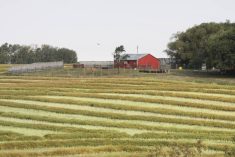LEXINGTON, Kentucky − Poverty can be linked to starvation and obesity.
The two conditions may seem incongruous but it is not uncommon to see obese people who are also malnourished because they are not eating nutritious food, said dietician Nikki Putnam Badding at the international Alltech conference held in Lexington, KY, May 19-21.
“Poverty is what causes hunger, that lack of access to food,” said Putnam Badding, who works for Alltech, an international company which develops crop science as well as animal health and nutrition products.
Read Also

Nutritious pork packed with vitamins, essential minerals
Recipes for pork
“Many people who are suffering from obesity are living in impoverished neighbourhoods called food deserts. A food desert is someplace where someone does not have access to fresh and healthy food. There is food there but it is things like chips and frozen pizzas and sodas found at convenience stores,” she said.
Hunger can kill while obesity is linked to a myriad of chronic health problems like heart disease and diabetes. Many countries that once suffered from hunger also have a dual burden of malnutrition and obesity.
The economic cost worldwide is more than $3 trillion a year to address over and under nutrition. Obesity related diseases cost $1.4 trillion per year.
Hunger and obesity are two sides of the same coin, a paradox first introduced in 1995. It was recognized as a form of malnutrition rather than a condition of over indulgence.
Obesity can also be an adaptive response to episodic food insufficiency.
Chronic variations in food supplies may cause people to eat more when food is available than they normally would. When they are not eating consistent meals people tend to store the calories and instead of burning them off, they are stored as fat.
“This is basically an evolutionary trait of our bodies to store fat for energy use later,” she said.
Lack of access to proper nutrition is food insecurity. In the short term it can lead to impaired brain development, lower IQ and weakened immune systems in children.
Those suffering from malnutrition have lower productivity, lost years of life, greater sickness and a poor quality of life.
“Food insecurity carries a massive amount of short-term health issues as well as the long term,” she said.


















